江苏高考英语百日训练之任务型阅读(22)含答案解析
江苏百校大联考任务型阅读综合练习题doc
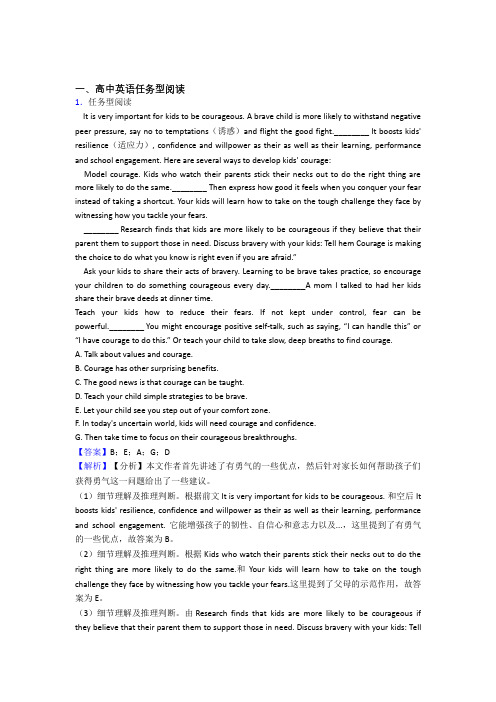
一、高中英语任务型阅读1.任务型阅读It is very important for kids to be courageous. A brave child is more likely to withstand negative peer pressure, say no to temptations(诱惑)and flight the good fight.________ It boosts kids' resilience(适应力), confidence and willpower as their as well as their learning, performance and school engagement. Here are several ways to develop kids' courage:Model courage. Kids who watch their parents stick their necks out to do the right thing are more likely to do the same.________ Then express how good it feels when you conquer your fear instead of taking a shortcut. Your kids will learn how to take on the tough challenge they face by witnessing how you tackle your fears.________ Research finds that kids are more likely to be courageous if they believe that their parent them to support those in need. Discuss bravery with your kids: Tell hem Courage is making the choice to do what you know is right even if you are afraid.”Ask your kids to share their acts of bravery. Learning to be brave takes practice, so encourage your children to do something courageous every day.________A mom I talked to had her kids share their brave deeds at dinner time.Teach your kids how to reduce their fears. If not kept under control, fear can be powerful.________ You might encourage positive self-talk, such as saying, “I can handle this” or “I have courage to do this.” Or teach your child to take slow, deep breaths to find courage.A. Talk about values and courage.B. Courage has other surprising benefits.C. The good news is that courage can be taught.D. Teach your child simple strategies to be brave.E. Let your child see you step out of your comfort zone.F. In today's uncertain world, kids will need courage and confidence.G. Then take time to focus on their courageous breakthroughs.【答案】B;E;A;G;D【解析】【分析】本文作者首先讲述了有勇气的一些优点,然后针对家长如何帮助孩子们获得勇气这一问题给出了一些建议。
江苏高考英语百日训练之任务型阅读(23)含答案解析
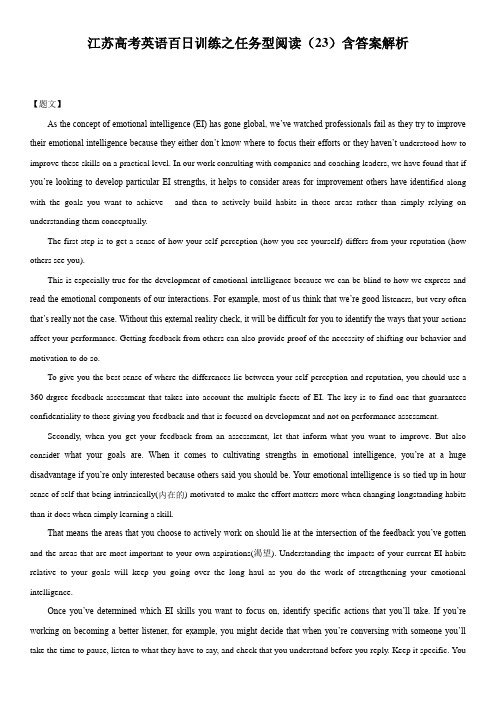
江苏高考英语百日训练之任务型阅读(23)含答案解析【题文】As the concept of emotional intelligence (EI) has gone global, we’ve watched professionals fail as they try to improve their emotional intelligence because they either don’t know where to focus their efforts or they haven’t understood how to improve these skills on a practical level. In our work consulting with companies and coaching leaders, we have found that if you’re looking to develop particular EI strengths, it helps to consider areas for improvement others have identi fied along with the goals you want to achieve----and then to actively build habits in those areas rather than simply relying on understanding them conceptually.The first step is to get a sense of how your self-perception (how you see yourself) differs from your reputation (how others see you).This is especially true for the development of emotional intelligence because we can be blind to how we express and read the emotional components of our interactions. For example, most of us think that we’re good lis teners, but very often that’s really not the case. Without this external reality check, it will be difficult for you to identify the ways that your actions affect your performance. Getting feedback from others can also provide proof of the necessity of shifting our behavior and motivation to do so.To give you the best sense of where the differences lie between your self-perception and reputation, you should use a 360-drgree feedback assessment that takes into account the multiple facets of EI. The key is to find one that guarantees confidentiality to those giving you feedback and that is focused on development and not on performance assessment.Secondly, when you get your feedback from an assessment, let that inform what you want to improve. But also consid er what your goals are. When it comes to cultivating strengths in emotional intelligence, you’re at a huge disadvantage if you’re only interested because others said you should be. Your emotional intelligence is so tied up in hour sense of self that being intrinsically(内在的) motivated to make the effort matters more when changing longstanding habits than it does when simply learning a skill.That means the areas that you choose to actively work on should lie at the intersection of the feedback you’ve gotten and the areas that are most important to your own aspirations(渴望). Understanding the impacts of your current EI habits relative to your goals will keep you going over the long haul as you do the work of strengthening your emotional intelligence.Once you’ve determined which EI skills you want to focus on, identify specific actions that you’ll take. If you’re working on becoming a better listener, for example, you might decide that when you’re conversing with someone you’ll take the time to pause, listen to what they have to say, and check that you understand before you reply. Keep it specific. Youshould also take every naturally occurring opportunity to practice the skill you’re developing, no matter how small.By starting to change your routine reactions, you’ll be well on your way to figuring out the old habits that aren’t serving you well and transforming them into new, improved ones that do.【答案】51. confuses/puzzles52. differences53. capable54. motivated55. assess 56. matters/counts57. recognize/know/identify58. Combining59. specific/clear/explicit60. Remove/Abandon/Quit【解析】本文探讨了提高情商的方法:了解自我认知与声誉之间的区别,明确目标,确定改变具体的行动。
江苏高考英语百日训练之任务型阅读(20)含答案解析
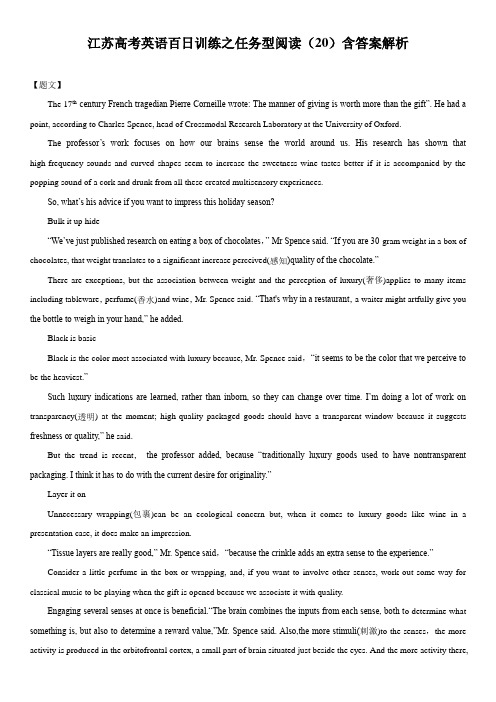
江苏高考英语百日训练之任务型阅读(20)含答案解析【题文】The 17th-century French tragedian Pierre Corneille wrote: The manner of giving is worth more than the gift”. He had a point, according to Charles Spence, head of Crossmodal Research Laboratory at the University of Oxford.Th e professor’s work focuses on how our brains sense the world around us. His research has shown that high-frequency sounds and curved shapes seem to increase the sweetness wine tastes better if it is accompanied by the popping sound of a cork and drunk from all these created multisensory experiences.So, what’s his advice if you want to impress this holiday season?Bulk it up hide“We’ve just published research on eating a box of chocolates,” Mr Spence said. “If you are 30-gram weight in a box of chocolates, that weight translates to a significant increase perceived(感知)quality of the chocolate.”There are exceptions, but the association between weight and the perception of luxury(奢侈)applies to many items including tableware,perfume(香水)and wine,Mr. Spence said. “That's why in a restaurant,a waiter might artfully give you the bottle to weigh in your hand,” he added.Black is basicBlack is the color most associated with luxury because, Mr. Spence said,“it seems to be the color that we perceive to be the heaviest.”Such luxury indications are learned, rather than inborn, so they can change over time. I’m doing a lot of work on transparency(透明) at the moment; high-quality packaged goods should have a transparent window because it suggests freshness or quality,” he said.But the trend is recent,the professor added, because “traditionally luxury goods used to have nontransparent packaging. I think it has to do with the current desire for originality.”Layer it onUnnecessary wrapping(包裹)can be an ecological concern but, when it comes to luxury goods like wine in a presentation case, it does make an impression.“Tissue layers are really good,” Mr. Spence said,“because the crinkle adds an extra sense to the experience.”Consider a little perfume in the box or wrapping, and, if you want to involve other senses, work out some way for classical music to be playing when the gift is opened because we associate it with quality.Engaging several senses at once is beneficial.“The brain combines the inputs from each sense, both t o determine what something is, but also to determine a reward value,”Mr. Spence said. Also,the more stimuli(刺激)to the senses,the more activity is produced in the orbitofrontal cortex, a small part of brain situated just beside the eyes. And the more activity there,the more rewarding something is perceived to be.You can go too far“Engaging an extra sense is more effective, but you can potentially have a disagreement if that extra sense doesn’t match the others.” the professor said.【答案】71. How 72. senses 73. Advice/Suggestions/Tips74. weight 75. Package/Pack/Wrap 76. tend/prefer77. appeal 78. hearing 79. extremes 80. matters/counts【解析】这是一篇说明文。
江苏高考英语新题型中的任务型阅读试题解析-2019年精选文档

5.善于总结、归纳要点。
三、能力要求此题要求考生在读完一篇短文后,根据文中相关内容,填写表格中相应的工程。
这实际上是对已阅读信息的二次加工。
要求考生归纳概括文中要点,整合零散信息并把加工后系统化的信息以表格的形式有序地表达出来,使零散信息形象化、条理化、明朗化和简单化。
通过阅读表格使读者能够迅速理清文章结构,获取主要信息,抓住段落主题,了解文章大意。
该题属综合能力考查题,强调主观表达能力、语言理解能力和逻辑推断能力。
所选短文一般简洁明了,难度适当,因此,要求考生能够运用根本的语法知识。
1.阅读理解的能力〔1〕对所阅读文章的整体把握。
阅读文章时,首先需要领略文章大意,并通过归纳概括,提炼出全文的主题。
这既是阅读理解的需要,又是做题的需要。
任务型阅读的图表中有时会在标题〔Title〕局部设置试题,但自2021年以来,江苏考卷还没有在标题局部设置过试题。
〔2〕对所阅读文章结构和层次的把握。
把握文章的结构和层次,即了解文章围绕其中心思想以怎样的形式展开〔包括文章的段落可以分成哪几个局部〕,文章各局部的表达分成怎样的层次。
任务型阅读试题的图形往往都是按照文章的结构和层次设置的,因此把握文章结构和层次对做好试题所起的积极作用毋庸多言。
〔3〕对文章局部精读,到达透彻理解。
大局部任务型阅读试题还是细节信息题,对与试题相关的文章的各个局部需要进行精读,运用分析、判断、推理等到达透彻理解,非如此缺乏以选准确所填词汇。
〔4〕对任务型阅读图表的识读能力。
任务型阅读的阅读理解能力,还应包括对试题图表的识读判别,要能够迅速理解命题人的出题角度、图表的结构分布层次、图表中文字的含义等。
2.良好的分析、概括和逻辑推断能力分析、概括和逻辑推断能力主要指对相关信息的处理加工能力。
这既是阅读理解、明白文意的需要,更是完成图表试题的需要。
图表虽然和文章内容是一致的,但它毕竟表达了命题人的某种思维角度,需要对此进行分析;图表中的文字表述和试题还可能涉及文意的延展、概括、总结、展望等,这些内容有可能没有在原文词汇中表达,因此考生需要分析、概括和推断,以选对文外的词汇填空。
江苏高考英语百日训练之任务型阅读(3)含答案解析
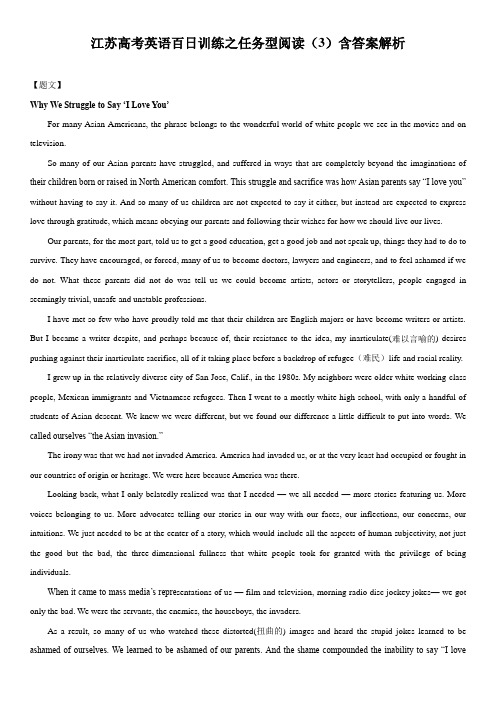
江苏高考英语百日训练之任务型阅读(3)含答案解析【题文】Why We Struggle to Say ‘I Love You’For many Asian-Americans, the phrase belongs to the wonderful world of white people we see in the movies and on television.So many of our Asian parents have struggled, and suffered in ways that are completely beyond the imaginations of their children born or raised in North American comfort. This struggle and sacrifice was how Asian parents say “I love you” without having to say it. And so many of us children are not expected to say it either, but instead are expected to express love through gratitude, which means obeying our parents and following their wishes for how we should live our lives.Our parents, for the most part, told us to get a good education, get a good job and not speak up, things they had to do to survive. They have encouraged, or forced, many of us to become doctors, lawyers and engineers, and to feel ashamed if we do not. What these parents did not do was tell us we could become artists, actors or storytellers, people engaged in seemingly trivial, unsafe and unstable professions.I have met so few who have proudly told me that their children are English majors or have become writers or artists. But I became a writer despite, and perhaps because of, their resistance to the idea, my inarticulate(难以言喻的) desires pushing against their inarticulate sacrifice, all of it taking place before a backdrop of refugee(难民)life and racial reality.I grew up in the relatively diverse city of San Jose, Calif., in the 1980s. My neighbors were older white working-class people, Mexican immigrants and Vietnamese refugees. Then I went to a mostly white high school, with only a handful of students of Asian descent. We knew we were different, but we found our difference a little difficult to put into words. We called ourselves “the Asian invasion.”The irony was that we had not invaded America. America had invaded us, or at the very least had occupied or fought in our countries of origin or heritage. We were here because America was there.Looking back, what I only belatedly realized was that I needed — we all needed — more stories featuring us. More voices belonging to us. More advocates telling our stories in our way with our faces, our inflections, our concerns, our intuitions. We just needed to be at the center of a story, which would include all the aspects of human subjectivity, not just the good but the bad, the three-dimensional fullness that white people took for granted with the privilege of being individuals.When it came to mass media’s repre sentations of us — film and television, morning radio disc jockey jokes— we got only the bad. We were the servants, the enemies, the houseboys, the invaders.As a result, so many of us who watched these distorted(扭曲的) images and heard the stupid jokes learned to be ashamed of ourselves. We learned to be ashamed of our parents. And the shame compounded the inability to say “I loveyou,” a phrase that belonged to the wonderful world of white people we saw in the movies and television.We had to learn better, but the truth is that Asian parents have to learn better, too. You cannot be proud of your artist and storyteller children only when they win Golden Globes. We honor your sacrifice for us, but you have to encourage your children to speak up as well, to claim their voices, to risk failure, to tell their stories and your stories. At the very least, you cannot stand in their way.We are still the Asian invasion in the eyes of many. We cannot accept this as our price of entry into American society. If we must assert ourselves and speak out against racism when it is directed against us, we must also do so when it benefits us. And we do that by challenging and changing the American story. We do it by taking the stage and by telling our own stories, which is really, in the end, our way of saying “I love you” to our parents, our families, our communities and our country.【答案】51. understand / imagine 52. prejudice53. expectations / wishes 54. survival55. resistant / opposed 56. conflict57. distinguishes / tell 58. perfect59. fail 60. place/voice【解析】本文是一篇议论文。
江苏高考英语百日训练之任务型阅读(2)含答案解析

江苏高考英语百日训练之任务型阅读(2)含答案解析【题文】What You Are Is a MultipotentialiteA multipotentialite is someone with many interests and creative pursuits. It’s easy to see your multipotentiality as a limitation or a pain that you need to overcome. But what I’ve learned through speaking with people and writing about these ideas on my website, is that there are some tremendous strengths to being this way. Here are three multipotentialite super powers.One: idea synthesis. That is, combining two or more fields and creating something new at the intersection. Innovation happens at the intersections. That’s where the new ideas come from. And multipotentialites, with all of their backgrounds, are able to access a lot of these points of intersection.The second multipotentialite superpower is rapid learning. When multipotentialites become interested in something, we go hard. We observe everything we can get our hands on. We’re also used to being beginners, because we’ve been beginners so many times in the past, and this means tha t we’re less afraid of trying new things and stepping out of our comfort zones. What’s more, many skills are transferable across disciplines, and we bring everything we’ve learned to every new area we pursue, so we’ve rarely starting from scratch.The third multipotentialite superpower is adaptability; that is, the ability to fit in whatever you need to be in a given situation. Abe Cajudo is sometimes a video director, sometimes a web designer, sometimes a Kickstarter consultant, sometimes a teacher, and sometimes, apparently, James Bond.He’s valuable because he does good work. He’s even more valuable because he can take on various roles, depending on his clients needs. Fast Company magazine identified adaptability as the single most important skill to develop in order to thrive in the 21st century. The economic world is changing so quickly and unpredictably that it is the individuals and organizations that can pivot (灵活变通) in order to meet the needs of the market that are really going to thrive.Idea synthesis, rapid learning and adaptability: three skills that multipotentialites are very good at, and three skills that they might lose if pressured to narrow their focus. As a society, we have a vested interest (既得利益) in encouraging multipotentialites to be themselves. We have a lot of complex, multidimensional problems in the world right now, and we need creative, out-of-the-box thinkers to tackle them.In fact, some of the best team are made up of a specialist and multipotentialite paired together. The specialist can dive in deep and implement ideas, while the multipotentialite brings a breadth of knowledge to the project. It’s a beautiful partnership.Therefore, I say, embrace your many passions. Follow your curiosity down those rabbit holes. Explore yourintersections. Embracing our inner wiring leads to a happier, more authentic life. And perhaps more importantly—multipotentialites, the world needs us.【答案】71. creative 72. mistaken 73. accessible/available 74. pains 75. apply/bring76. adapting 77. predicted 78. conclusion 79. encouraged 80. match【解析】【标题】江苏省2018届高三高考学科基地密卷英语试题(四)【结束】。
高考英语百日训练之阅读理解(22)含答案解析
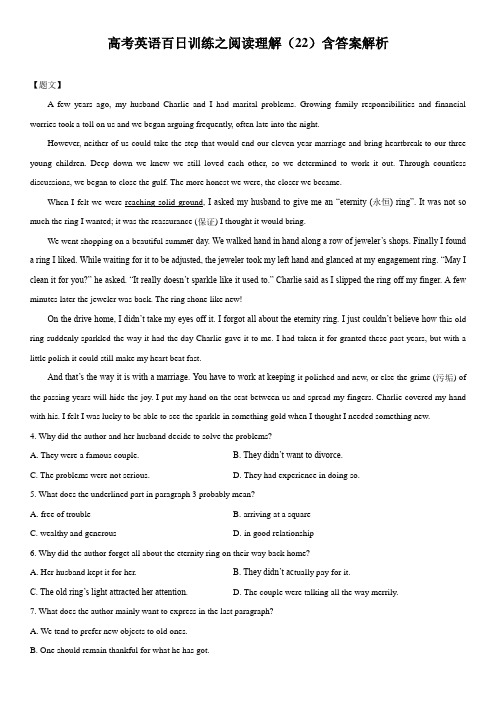
高考英语百日训练之阅读理解(22)含答案解析【题文】A few years ago, my husband Charlie and I had marital problems. Growing family responsibilities and financial worries took a toll on us and we began arguing frequently, often late into the night.However, neither of us could take the step that would end our eleven-year marriage and bring heartbreak to our three young children. Deep down we knew we still loved each other, so we determined to work it out. Through countless discussions, we began to close the gulf. The more honest we were, the closer we became.When I felt we were reaching solid ground, I asked my husband to give me an “eternity (永恒) ring”. It was not so much the ring I wanted; it was the reassurance (保证) I thought it would bring.We went shopping on a beautiful summ er day. We walked hand in hand along a row of jeweler’s shops. Finally I found a ring I liked. While waiting for it to be adjusted, the jeweler took my left hand and glanced at my engagement ring. “May I clean it for you?” he asked. “It really doesn’t sparkle like it used to.” Charlie said as I slipped the ring off my finger. A few minutes later the jeweler was back. The ring shone like new!On the drive home, I didn’t take my eyes off it. I forgot all about the eternity ring. I just couldn’t believe how th is old ring suddenly sparkled the way it had the day Charlie gave it to me. I had taken it for granted these past years, but with a little polish it could still make my heart beat fast.And that’s the way it is with a marriage. You have to work at keeping it polished and new, or else the grime (污垢) of the passing years will hide the joy. I put my hand on the seat between us and spread my fingers. Charlie covered my hand with his. I felt I was lucky to be able to see the sparkle in something gold when I thought I needed something new.4. Why did the author and her husband decide to solve the problems?A. They were a famous couple.B. They didn’t want to divorce.C. The problems were not serious.D. They had experience in doing so.5. What does the underlined part in paragraph 3 probably mean?A. free of troubleB. arriving at a squareC. wealthy and generousD. in good relationship6. Why did the author forget all about the eternity ring on their way back home?A. Her husband kept it for her.B. They didn’t ac tually pay for it.C. The old ring’s light attracted her attention.D. The couple were talking all the way merrily.7. What does the author mainly want to express in the last paragraph?A. We tend to prefer new objects to old ones.B. One should remain thankful for what he has got.C. Marriage should be constantly polished.D. We should try to rediscover the true value of old objects.【答案】4. B 5. D 6. C 7. C【解析】【分析】本文是一篇夹叙夹议文。
江苏省梁丰高级中学高考任务型阅读专题及答案 百度文库
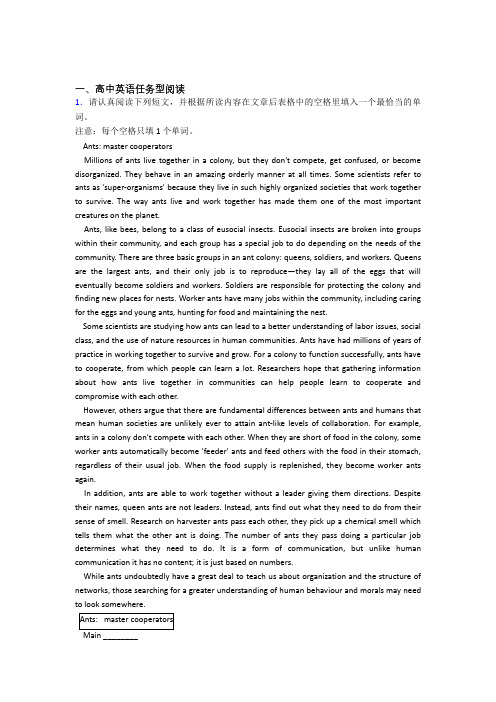
一、高中英语任务型阅读1.请认真阅读下列短文,并根据所读内容在文章后表格中的空格里填入一个最恰当的单词。
注意:每个空格只填1个单词。
Ants: master cooperatorsMillions of ants live together in a colony, but they don't compete, get confused, or become disorganized. They behave in an amazing orderly manner at all times. Some scientists refer to ants as 'super-organisms' because they live in such highly organized societies that work together to survive. The way ants live and work together has made them one of the most important creatures on the planet.Ants, like bees, belong to a class of eusocial insects. Eusocial insects are broken into groups within their community, and each group has a special job to do depending on the needs of the community. There are three basic groups in an ant colony: queens, soldiers, and workers. Queens are the largest ants, and their only job is to reproduce—they lay all of the eggs that will eventually become soldiers and workers. Soldiers are responsible for protecting the colony and finding new places for nests. Worker ants have many jobs within the community, including caring for the eggs and young ants, hunting for food and maintaining the nest.Some scientists are studying how ants can lead to a better understanding of labor issues, social class, and the use of nature resources in human communities. Ants have had millions of years of practice in working together to survive and grow. For a colony to function successfully, ants have to cooperate, from which people can learn a lot. Researchers hope that gathering information about how ants live together in communities can help people learn to cooperate and compromise with each other.However, others argue that there are fundamental differences between ants and humans that mean human societies are unlikely ever to attain ant-like levels of collaboration. For example, ants in a colony don't compete with each other. When they are short of food in the colony, some worker ants automatically become 'feeder' ants and feed others with the food in their stomach, regardless of their usual job. When the food supply is replenished, they become worker ants again.In addition, ants are able to work together without a leader giving them directions. Despite their names, queen ants are not leaders. Instead, ants find out what they need to do from their sense of smell. Research on harvester ants pass each other, they pick up a chemical smell which tells them what the other ant is doing. The number of ants they pass doing a particular job determines what they need to do. It is a form of communication, but unlike human communication it has no content; it is just based on numbers.While ants undoubtedly have a great deal to teach us about organization and the structure of networks, those searching for a greater understanding of human behaviour and morals may need to look somewhere.They live together in colony without competitions, ________ or being disorganizedThe way they work together for ________ living in highly organized societies makes them unique on the planet.Three groups, including queens, soldiers and workers in an ant colony have a special job, ________ the needs of the community ________ of studying ants.It helps people understand labor issues, social class, and the use of natural resources better Ants are ________ in working together to survive and grow, helping people run the communities smoothlyIt helps people learn to cooperate and ________ with each otherDifferences between ants and humansFor ________ of food some worker ants automatically become "feeder ants ________ ants, humans have leaders giving people directionsSuggestionResearchers should have different ________ in understanding human behaviour and morals.【答案】features/characteristics;confusion;survival;determining;Significance/Importance/Meaning/Benefits;experienced;compromise;shortage/lack;Unlike;angles【解析】【分析】本文是一篇说明文,通过对蚂蚁的研究了解了它们的特点以及与人类之间的关系。
- 1、下载文档前请自行甄别文档内容的完整性,平台不提供额外的编辑、内容补充、找答案等附加服务。
- 2、"仅部分预览"的文档,不可在线预览部分如存在完整性等问题,可反馈申请退款(可完整预览的文档不适用该条件!)。
- 3、如文档侵犯您的权益,请联系客服反馈,我们会尽快为您处理(人工客服工作时间:9:00-18:30)。
江苏高考英语百日训练之任务型阅读(22)含答案解析【题文】On the surface, one would be hard-pressed to find many similarities between German chancellor Angela Merkel, Bangladeshi prime minister Sheikh Hasina, and Liberian president Ellen Johnson Sirleaf --- except for the fact that they are all female leaders of nations. Merkel, for example, spent more than a decade as a chemist before going into politics, while Hasina, the daughter of Bangladesh ’s first president, served as her father’s political assistant while at college, and Jo hnson Sirleaf worked at multiple financial institution s before running for vice president. Is there something deeper than they share?The researcher Susan R. Madsen of Utah Valley University interviewed women in some countries about their paths to leadership. She was surprised by the similarities among the women when they spoke about how they became leaders. “Every single one of them talked about finding their voices and their confidence at dinner-table conversations with their families. Their parents talked about politics, about what was happening in the community, and when the women had something to say, their parents didn't stop them,” Madsen said.As part of a series of interviews on women and leadership, I spoke to three women from different countries who have each become leaders in their respective fields: Agnes lgoye of Uganda, who works with her government to counter human trafficking; Ikram Ben Said, the founder of Tunisian women’s rights organization Aswat Nissa; and Sairee Chahal of India, who started a digital platform that helps women get back into the workforce.All three of my interviewees pointed to the family environment they had been raised in --- particularly a father figure who taught and empowered the women in the family to learn, ask questions, and form their own opinions. Also, mothers broke convention by displaying leadership within the family.Igoye, for example, credited her father with having the foresight to send his daughters to school despite opposition from others in their village. Her mother went back to school as an adult to improve her career as a teacher, which lgoye described as being a big influence on her. Similarly Ben Said talked about how her father encouraged political debate among the family when she was growing up, even when her opinions contradicted his. Meanwhile, Chahal said that even in her younger days, her parents went against the general convention of expecting their daughters to aim only for a good husband.Another conclusion from Madsen's work is that women's leadership development doesn't look like men's. “Men tend to follow a more straight path to becoming a leader. Women's paths are much emergent. They tend to not necessarily look ahead and think, ‘I want to be on top.’ Women would point to a number of expe riences--- motherhood, or working with a non-profit, or sitting on a board, as shaping their path to becoming leaders,” she said.Actually, women leaders tend to be held to higher standards than their male counterparts. lgoye has felt this in Uganda.“Women who take up leadership positions in my country have to be tough, it's not easy at all,” she said. “You are always aware that you are representing all women. You have to work extra hard to deliver, to perform, because if you do something wrong, they will say, ‘Ah, you see, women!’ ”Therefore, merely having women leaders can change the opportunities available for generations of women in a country. What leadership looks like in their country, how much of a voice the women leaders are having, influences what leadership is and what it means to its women.What do women leaders have in common?【答案】51. similarity/similarities52. freely/casually53. exposed54. top 55. owed/attributed56. education/schooling57. against58. marrying59. harder 60. means/matters【解析】这是一篇说明文。
研究人员采访了一些国家的女性,询问她们通往领导岗位的道路。
这些女性在谈到她们如何成为领导者时都有一些相似之处。
他们都将成功归功于自己所生长的家庭环境。
同时结合了Igoye、Ben和Chahal三位女性的自身经历得出结论:女性的领袖对于国家和其他女性而言意义重大。
【51题详解】根据第一段第一句On the surface, one would be hard-pressed to find many similarities between German chancellor Angela Merkel, Bangladeshi prime minister Sheikh Hasina, and Liberian president Ellen Johnson Sirleaf可知这些女性领导人来自不同的文化和政治背景,但她们有什么相似点吗?故填similarity/similarities。
【52题详解】第二段第三行…finding their voices and confidence at dinner—table conversations with their families.她们可以在晚饭时间在饭桌上自由的演说。
故填freely/ casually。
【53题详解】根据第二段最后一句话Their parents talked about politics, about what was happening in the community, and when the women had something to say, their parents didn't stop them,可知她们的父母谈论政治,谈论社区里发生的事情,当女性有话要说时,她们的父母没有阻止她们。
